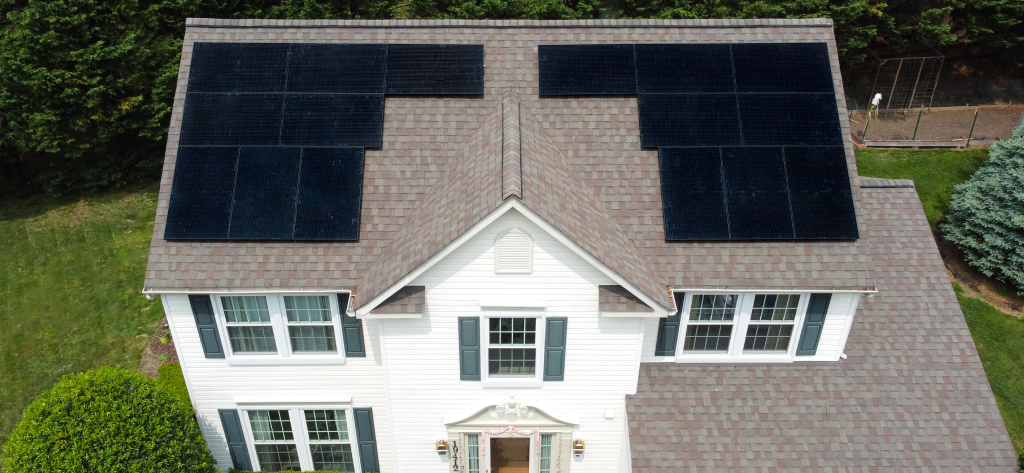Article
How Net Metering Works in Washington D.C.

Solar energy goals in Washington, D.C., are among the most ambitious in the country, and the District’s net metering policies are a big part of the program. Officials hope to achieve 100% renewable energy by 2032, with at least 5% of that power sourced from local solar resources.
If you’re interested in learning how a solar panel array can reduce your utility bills, improve your carbon footprint, and help the District reach critical sustainability benchmarks, you’re in the right place!
What is Net Metering?
Net metering is a billing arrangement between utility companies and customers who generate their own electricity using solar panels, also called “customer-generators.” When a residential solar panel array generates more power than a customer uses, that excess energy is sent to the electrical grid for other customers to use. In turn, the customer-generator receives credits to their utility account, offsetting future bills.
So, how do solar panels transform sunlight into usable energy? Photovoltaic cells are made of a semiconductor material that captures UV radiation and releases electrons. These electrons migrate toward the panel’s surface and disturb the existing electrical charge, resulting in voltage that can power electronic devices.
Interconnected solar panel arrays use bidirectional meters to measure the flow of electricity both to and from your utility company and your home or business. These devices facilitate net metering programs in Washington and beyond to ensure excess energy produced goes to good use.
How Net Metering Works in Washington D.C.
According to the net metering law in Washington, utility customers who utilize solar panel arrays to generate some of their energy needs can receive a credit on their power bills for excess electricity collected each month. This can be achieved in a number of ways. If you own your home, you may install solar panels on your property that meet the city’s criteria. If you’re a tenant, you can participate in various public solar programs to receive credits for the energy produced by off-site installations called community renewable energy facilities (CREFs). At the end of 2023, CREFs accounted for 367 of the 13,533 solar panel arrays in D.C.
A number of local initiatives aim to bring renewable energy to more District residents, including Solar for All, Solarize D.C., and Solar Switch. Each of these programs helps foster the adoption of solar power by making photovoltaic systems more accessible to the general public as well as low- and middle-income residents.
Billing and Credit System
Many jurisdictions offering net metering programs impose strict limitations on system capacities and reimbursement rates, but not Washington. In fact, the District of Columbia provides greater returns for net metering customers than many other locations. Monthly and annual excess generation credit rates equal the full retail amount for electricity per kilowatt (kW).
While this full retail rate is standard for monthly reimbursements, many other locations reduce repayment rates for excess energy generation beyond what a customer uses in a single 12-month period. Service providers often balance these accounts at the end of each fiscal year. In order to minimize the amount they must pay customers for energy production, they may reduce the annual reimbursement rate. However, net metering customers in Washington can enjoy full retail rates despite the amount of energy generated over the course of the year.
There’s no roll-over limit and no consequence for consistently generating more energy than is used. As long as each customer’s solar panel system meets eligibility requirements, they can reap the rewards of Washington’s net metering programs.

How Solar Batteries Can Save You More
Eligibility for Net Metering
Both homeowners and renters can participate in Washington’s net metering programs. While solar is the most popular green energy choice in the District, you can also receive reimbursements for power generated by wind turbines, hydroelectric systems, geothermal, and other renewable sources.
Homeowners who install private solar panel arrays of no greater than 1 megawatt (MW) or 200% of their annual energy consumption may participate. Additionally, renters can join community solar panel centers, while commercial entities must adhere to a separate set of requirements.
Benefits of Net Metering in D.C.
Washington, D.C., residents will find a lot to love about the District’s net metering policies. Here are a few of the benefits:
Cost Savings
While homeowners, renters, and businesses can all lower their electricity bills by generating excess energy, this is far from the only financial incentive for D.C. residents. Federal tax credits will reimburse up to 30% of the cost of solar panel systems installed before 2032. In 2033, this rate drops to 26%.
Homeowners concerned about increased property taxes following solar installation can breathe a sigh of relief. Solar energy symptoms are exempt from personal property taxes in the District.
Environmental Impact
We’ve mentioned D.C.’s aggressive energy goals, such as the aim to achieve 100% renewable energy by 2032. By adopting solar panel systems and connecting to the utility grid via net metering, you can join the ranks of well over 13,000 approved solar setups in Washington. As more residents and businesses embrace renewable energy, D.C. will inch closer to the goals set forth in the Renewable Energy Portfolio Standard (RPS).
Energy Independence
In Washington and beyond, net metering offers more control over your energy bills and dependence on the centralized power grid. Residents and commercial entities can increase self-sufficiency and minimize strain on existing infrastructure by embracing renewable energy sources.
Job Creation and Economic Growth
Net metering stimulates private investment in solar energy and supports job creation within the renewable energy sector. According to the Solar Energy Industries Association, the adoption of solar power has created over 1,000 jobs in the District of Columbia.
Increased Property Value
Homes with solar installations benefit from higher property values, making them more attractive to buyers due to the potential for long-term energy savings. In fact, a Zillow study found that homes equipped with solar panels sell for an average of 4.1% higher than comparable properties without renewable energy systems.
The Impact and Future of Net Metering in Washington D.C.
The District of Columbia is well on its way to meeting its goals for renewable energy. With the help of residents, businesses, and community organizations like Sustainable D.C., more people are adopting solar panel systems and other forms of renewable energy.
Net metering is an excellent way for residents and businesses in Washington, D.C., to get the best return on their solar investments. By installing an eligible solar panel array and generating more energy than you need, you can earn valuable credits to offset future utility costs. You’ll also do your part to help the District achieve its ambitious goals for renewable energy.
Ready to embrace the power of the sun? Solar Energy World is here to help! Contact us today to schedule a free solar estimate and begin your journey to a more sustainable future!
Want a Free Solar Estimate?
Fill out the form to get started today.

